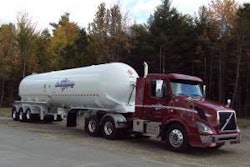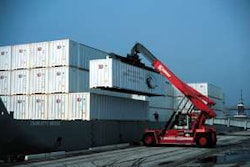
The American Trucking Associations on Thursday, April 7, announced that its membership has endorsed a policy supporting federal laws and regulations that would require trucking companies to use electronic logging devices to monitor driver hours-of-service. “ATA has always been in favor of strong enforcement of safety rules and regulations,” says Bill Graves, ATA president and chief executive officer. “This new policy just underlines that support.”
Graves says the Federal Motor Carrier Safety Administration’s safety monitoring program, Compliance Safety Accountability, shows a link between compliance with the current hours-of-service rules and carrier safety performance. “In addition to showing that the current hours-of-service rules are working, that data shows us that increasing compliance with those rules will further improve trucking’s already impressive safety record,” he says.
While ATA’s new policy expresses support for an electronic logging mandate, ATA believes any regulation or law also should address several issues, including:
• Cost-effective device specifications allowing for accurate recording of driving hours;
• Data ownership and access in order to protect the privacy of fleets and drivers alike; and
• Relief from the current burden of retaining additional supporting documentation.
“Many fleets already use these devices, and they report not only compliance and safety gains, but also improved efficiency,” says Dave Osiecki, ATA senior vice president of policy and regulatory affairs. “Those benefits make supporting an electronic logging requirement good business.”
ATA’s new policy was hailed by safety advocates as a positive step toward making the nation’s highways safer for all drivers. “We are very pleased that the ATA has decided to add their considerable weight to the call for both electronic logging as well as speed limiter settings at a reasonable top speed for our nation’s heavy trucks,” says Steve Owings, president of Road Safe America.
Owings says his group had been concerned that either of those initiatives, without the other, could lead to unintended dangerous consequences. “We firmly believe that the two together are complementary and will add greatly to our nation’s roadway safety situation,” he says. “We want to publicly thank the ATA for stepping up and taking a leadership position on both of these common-sense safety matters, which will undoubtedly make America’s public thoroughfares safer for all motorists.”
The Truckload Carriers Association last month also voted to support legislation and regulations that would mandate the use of electronic logging devices. TCA says the new policy is consistent with the industry’s commitment to cooperative measures for ensuring compliance with hours-of-service regulations.
FMCSA on Jan. 31 issued its Notice of Proposed Rulemaking that would require all interstate commercial truck and bus carriers that now use logbooks to track compliance with hours-of-service regulations would have to use electronic onboard recorders. The only exception to the new rule is short-haul interstate carriers that use timecards to document HOS. FMCSA expects to issue a final rule by July 2012 and begin enforcing the rule three years later in 2015.
The proposal would relieve carriers of the current requirement to retain certain hours-of-service documents, such as delivery and toll receipts, that now are used to verify the number of hours the vehicle is in operation. About 500,000 carriers would be affected by the proposed rule, FMCSA said.
Last year, the U.S. Court of Appeals for the District of Columbia ordered FMCSA to issue a NPRM on supporting documents by yearend. In December 2010, the court gave the agency another month – until Jan. 31 – to comply. The court order stemmed from a lawsuit ATA filed in early 2010 to compel FMCSA to move forward with a regulation as mandated by Congress in the mid-1990s. By the time ATA filed its lawsuit, FMCSA already had announced that it was planning to link new regulations on supporting documents to an expansion of the electronic onboard recorder mandate.












